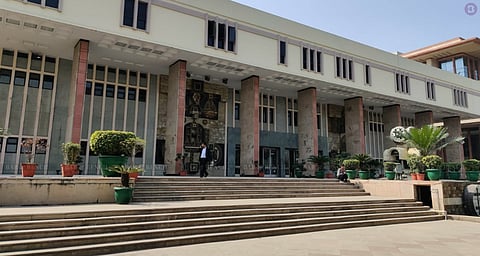
- Latest Legal News
- News
- Dealstreet
- Viewpoint
- Columns
- Interviews
- Law School
- Legal Jobs
- हिंदी
- ಕನ್ನಡ

The Delhi High Court recently observed that excessive greed in the hope for high returns in financial fraud cases leads to criminal consequences [Yogesh Singh v. State of NCT of Delhi & Anr.]
Justice Arun Monga questioned whether courts can become shelters for reckless risk-takers in such cases.
"When you give unsecured loans for such outrageous returns, are you then as innocent an investor ? Nay, perhaps a part gambler. And every gambler knows the rule of the game: when you win, you cheer; when you lose, you pay. You cannot bet your money on wild promises and then run to the law crying ―victim‖ when the bet goes bad. If you had the courage to take the risk, you must have the spine to face the consequences."
The matter pertains to a cheating case in which the complainant was assured of monthly returns at 24 per cent per annum for six months if he paid ₹1.5 crore to the accused in 2016. The accused neither paid the agreed interest nor returned the principal amount, leading to the complaint.
Counsel for the complainant took exception to the fact that the legitimacy of the first information report (FIR) was not under challenge in this case, which was an application filed in a bail matter.
However, the Court exercised its inherent powers under Section 528 of the Bharatiya Nagarik Suraksha Sanhita, 2023.
"...if the Court is satisfied that its intervention is necessary to prevent abuse of the process of the Court or otherwise to secure the ends of justice, the objection against this Court‘s jurisdiction under Section 528 will not be acceptable."
It ultimately held that the offence of cheating was not made out in this case, and that registration of the FIR was an abuse of process of law.
"The dispute appears to arise from the non-performance of contractual obligations, which has been given the colour of a criminal offence."
The Court questioned the gullibility of the victim who, lured by unrealistic returns, willingly dives into financial traps and then later cries foul running to seek the State’s help.
“Are these investors really as gullible as they claim? May be not. It could then rather be a façade of innocence worn by investors crying foul after losing money in schemes that promised them the moon. They knew exactly what they were signing up for i.e. unbelievably high returns of 24% annually or 2% every month. These are not returns; these are temptations,” the Court stated.
The Court stated that when a person consciously lends at high interest or acquires a debt, the fundamental principle of “buyer beware” should apply and the complainant should conduct its due-diligence.
It is the vice of greed that blinds the victims and drives them to fall prey to risky and fraudulent offers by scheming fraudsters, the Court added.
“Greed is a silent crime against wisdom. It blinds people to the obvious, drives them into risky ventures, and then makes them demand sympathy when the tide turns. Fraudsters must be punished, yes—but should Courts become shelters for reckless risk-takers...Let us call it what it is: a hunger for unearned wealth. When someone promises riches far beyond what the market offers, common sense should scream ―scam. But greed silences reason," the order stated.
An adverse inference was drawn by the Court on the incomplete investigation by the Delhi Police.
“It is abundantly clear that even after an inordinate delay of nearly six years, the investigation remains incomplete.. If any incriminating material against the accused had truly been unearthed, the charge sheet would have been filed long ago. No plausible explanation has been offered for this delay, which strongly indicates that either evidence against the accused is lacking or is being artificially manufactured."
The Court stated that the conduct of the investigating agency clearly reflects gross negligence and lack of due diligence.
“Despite repeated opportunities for investigation, the investigating agency has failed to make any progress sufficient to justify failure to file a charge sheet. This demonstrates the absence of substantive evidence, which by itself warrants quashing to prevent futile prosecution."
The Court concluded by sounding a word of caution that dubious offers of making easy money by investments is a trap.
To every dreamer chasing quick riches—it is a wake up call. Easy money is a trap. If the returns sound unbelievable, believe this instead: you are next in line to pay the price.
Justice Arun Monga
Advocates Jinendra Jain, Bijay Lakshmi, MN Mishra, Krishna Sharma, Manoj Gautam and Kashish Gupta appeared for the accused.
Additional Public Prosecutor Sanjeev Sabharwal appeared for the State.
Advocates Bharat Gupta and Tushar Rohmetra appeared for the complainant.